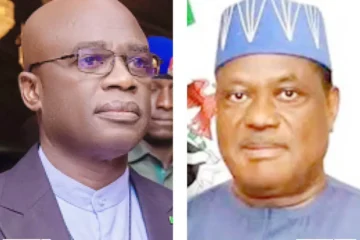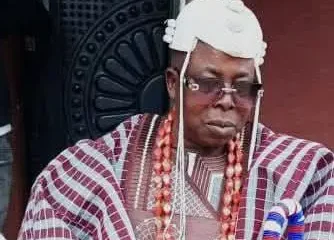
L-R: Gbadebo Rhodes-Vivour, Abdul-Azeez Adediran, and Babajide Sanwo-Olu
The Court of Appeal in Lagos has fixed Wednesday (today) to deliver judgment in the appeal filed by the governorship candidate of the Labour Party, Gbadebo Rhodes-Vivour and that of the Peoples Democratic Party (PDP) and its candidate, Abdulazeez Olajide Adediran challenging the re-election of Governor Babajide Sanwo-Olu.
A notice sent out by the court to parties in the appeal indicated the judgment will be delivered tomorrow at 3 pm.
Exactly a week ago, on Nov 7th, the Court of Appeal panel led by Justice Yargata Nimpar had reserved judgment in the two appeals after listening to the arguments of the parties.
Other Justices of the panel are Justice Samuel Bola and Justice Paul Bassi.
The court said the date for judgment would be communicated to the parties.
On September 25, the Election Petitions Tribunal had in its unanimous decision dismissed the two petitions and upheld the re-election of Governor Babajide Sanwo-Olu and his deputy Obafemi Hamzat.
At the hearing of the two appeals on Nov 7th, the three-man panel led by Justice Yargata Nimpar reserved the judgment after taking arguments from parties.
In his submission before the justices, the lead counsel to Rhodes-Vivour, Olagbade Benson, urged the court to allow the appeal, grant the reliefs sought and set aside the decision of the Tribunal delivered on Sept. 25th.
He also urged the court to interpret Section 182 (1) (a) of the Constitution and its implication to the qualification of the 2nd and 3rd respondents.
On Oct. 7th, Gbadebo-Rhodes Vivour filed his notice of appeal containing 21 grounds of appeal challenging the decision of the State Governorship Tribunal which upheld the return of Gov. Babajide Sanwo-Olu.
The appeal among others stated that the tribunal erred in law when it relied on the Court of Appeal’s decision in the petition of Mr. Peter Gregory Obi & Anor. Vs. INEC & Ors. to strike out the evidence of all his subpoenaed witnesses.
In Grounds 2 & 3, the appellants sticking with the issue of its subpoenaed witnesses also claimed that the Tribunal erred in law when it held that the three witnesses, PW7, PW8, and PW9 were not witnesses that fall within the category of witnesses that could be subpoenaed and subsequently discountenanced their oral evidence and documents on the premise that they were not listed as witnesses and their sworn statements did not accompany the Petition and documents frontloaded in line with the Electoral Act 2022.
In Grounds 4 & 5, Rhodes-Vivour contended that the Tribunal erred in law when it held that the burden of proof of the specific Oath of Allegiance subscribed to by the Deputy Governor as well as the evidence of his renounced citizenship rests on the Appellant and that exhibits placed before the tribunal on this issue were deemed abandoned.
It also stated that the tribunal failed to disqualify Sanwo-Olu and his deputy having found that Hamzat is a naturalized United States of America citizen who made a declaration of allegiance to that country.
Other grounds of the petition touched on the failure of the tribunal to disqualify Gov. Babajide Sanwo-Olu and his deputy having found that Dr. Obafemi Hamzat is a naturalized United States of America citizen who made a declaration of allegiance to that country.
Rhodes-Vivour argued that Section 177 of the 1999 Constitution states that only a Nigerian citizen by birth is qualified to contest for the office of Governor and Deputy Governor of a State.
In its response to the appeal, counsel to Gov. Sanwo-Olu and Dr. Obafemi Hamzat, Senior Advocate of Nigeria, Chief Wole Olanipekun urged the court to dismiss the appeal.
He contended that the dual citizenship argued by the appellant was never presented before the tribunal.
“They are now presenting a case of dual citizenship, they believe that this is a trial court. The tribunal found out that the purported oath of allegiance to a foreign country was not before it so it ruled it out. We urge your Lordship to dismiss this appeal,” he said.
In the appeal of the PDP & its governorship candidate, Azeez Olajide Adediran popularly known as Jandor, he filed 34 grounds of appeal against the judgment of the Tribunal which declared Governor Babajide Sanwo-Olu as the winner of the election.
In the grounds of appeal, Jandor says “Contrary to the misleading conclusion of the Tribunal, the issue of disqualification of the winner of an election, is both a pre and post-election dispute, and it was highly erroneous of the Tribunal to treat it as merely a pre-election issue”.
The candidate and his party, also reiterated the reliefs in their petitions, asking for the disqualification of the candidates of both the APC and Labour Party.
Jandor also faulted the tribunal for striking out the Labour Party and its candidate from his petition especially as he had made several allegations of infractions against Rhodes-Vivour. He noted that the law acknowledges that everyone against whom an allegation is made, must be made a party in such an action.
The PDP candidate in his appeal also said that he deserved to raise issues in the tertiary qualifications of Gov Sanwo-Olu which were built on false A Level WAEC Certificates as demonstrated in some of the exhibits he placed before the court.
Among other reliefs, he wants the Court of Appeal to hold that the tribunal had no jurisdiction to hold that the different names in the different certificates presented by the Sanwo-Olu belong to the same person.
At the time of the Governorship Election of Sat. March 18, 2023, Sanwo-Olu and Hamzat were not qualified to have contested the elections.
All the votes recorded for both candidates and the APC in the said election were wasted votes owing to the non-qualification of the 2nd and 3rd to have participated in the election.
That Jandor having scored the third highest number of votes in the Election and having satisfied the provisions of the Electoral Ac,t 2022, is the validly qualified candidate to be returned as the winner of the said election.
In its response, counsel to Sanwo-Olu and Hamzat, Senior Advocate of Nigeria, Bode Olanipekun, submitted that the reliefs sought by the appellants are such that they must succeed on the strength of their petition and not on the weakness of the respondent’s defence.
He argued that the appellants did not prove anything before the lower tribunal and no burden shifted to the respondents to disprove any fact.
“In the instant case, the petitioner tendered the alleged false A Level WAEC Certificates from the bar, and could not produce before the Court the Original document from which the exhibit was counterfeit.
“It is trite law that where oral evidence and documentary evidence tendered by a party in proof of a fact says different, that party cannot be said to have led credible and cogent evidence in proof of that fact,” Olanipekun said.
He subsequently urged the court to dismiss the appeal.











